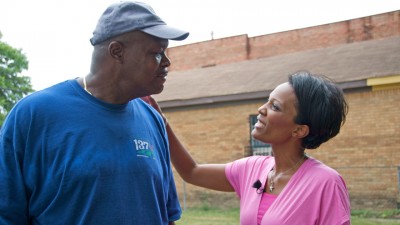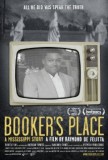| Reviews & Columns |
|
Reviews DVD TV on DVD Blu-ray 4K UHD International DVDs In Theaters Reviews by Studio Video Games Features Collector Series DVDs Easter Egg Database Interviews DVD Talk Radio Feature Articles Columns Anime Talk DVD Savant Horror DVDs The M.O.D. Squad Art House HD Talk Silent DVD
|
DVD Talk Forum |
|
|
| Resources |
|
DVD Price Search Customer Service #'s RCE Info Links |
|
Columns
|
|
|
Booker's Place: A Mississippi Story

Reviewed at the 2012 Tribeca Film Festival
The interview comes about eleven minutes into the NBC News documentary, which was called Mississippi: A Self Portrait, and which ran in 1967. His name was Booker Wright, and he was a waiter at an all-white restaurant in Greenwood, Mississippi. He spent his days running his own bar on the other side of town, and that's where Frank De Felitta interviewed him about working at the restaurant. "Some people are nice," he told the camera, "some, not. Some call me Booker, some call me John, some call me Jim. Some call me nigger." But no matter what they called him, Wright said, he smiled. "Always learn to smile. The meaner the man be, the more you smile--although you cry on the inside."
It's easy to underestimate how revelatory this was when it aired, how rare it was to see a black person, on network television, speaking this plainly and openly about the state of race relations. And Booker Wright paid for that candor: he lost his job, his bar was burned, and he was nearly beaten to death by Greenwood police. He was killed a few years later, under murky circumstances. "They blamed me," Frank De Felitta says now. "And I deserved it."
Frank's son disagrees. His name is Raymond De Felitta, and is a filmmaker as well (he directed City Island and The Thing About My Folks). His film is called Booker's Place: A Mississippi Story, and in it, he examines the story of Booker Wright from several angles: by looking at how his father made the film, and why; by creating a portrait of that particular time and place; and by investigating Wright's life before it intersected with his father's, and what happened to him after.
That investigation is conducted with the help of Yvette Johnson, Wright's granddaughter, who is able to fill in some of the blank spaces and has some questions of her own. Her curiosity about her grandfather in many ways mirrors Raymond's attempt to know his father better, to understand his life by preserving and (in a sense) completing his work.
The elder De Felitta's memories of the shoot are vivid--how he was told "Try to come back alive," as he set off for the small town, how he encountered the various white landowners and power brokers who insisted that everyone in Greenwood, Mississippi got along just fine, thank you very much. He shot a round table with five business owners, the muckety-mucks of the "Citizens' Council," who speak in the bland pleasantries of casual, institutionalized racism. "Every last one of them was a member of the Klan," Raymond is told.
De Felitta is an accomplished documentarian, and he takes on a wealth of material and ideas here, moving smoothly between the threads. Really, they amount to several stories about one story, and it is the story that Booker Wright told in that footage, which is presented in snippets and in its entirety, where it still packs a wallop--because of his raw honesty, and because of the way he smiles through his pain.
When Yvette Johnson would hear about her grandfather, she admits, it was as something of an "accidental activist." But Frank remembers warning Booker about what he was doing, about the choice that he made. "The time has come," Booker replied. "I gotta talk the way I feel." And that's the story of the civil rights movement, writ small: injustices finally exposed, in the voices of ordinary people. Booker's Place is effortlessly moving and endlessly powerful; this is an exemplary film.
Jason lives in New York. He holds an MA in Cultural Reporting and Criticism from NYU.
|
| Popular Reviews |
| Sponsored Links |
|
|
| Sponsored Links |
|
|
| Release List | Reviews | Shop | Newsletter | Forum | DVD Giveaways | Blu-Ray | Advertise |
|
Copyright 2024 DVDTalk.com All Rights Reserved. Legal Info, Privacy Policy, Terms of Use,
Manage Preferences,
Your Privacy Choices | |||||||










